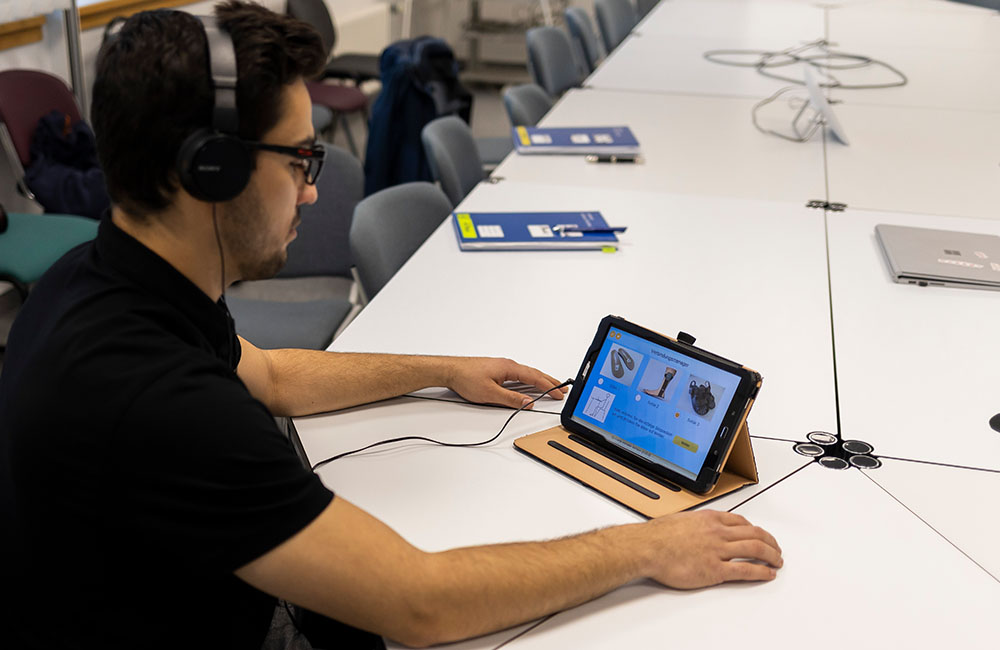A ‘TÜV’ for the nerves
Playful test tasks on a smartphone combined with a sensor-supported insole can be used to recognise nerve damage and cognitive impairments in people with diabetes. This was reported by a research team from the University Clinic for Renal and Hypertensive Diseases, Diabetology and Endocrinology at Otto von Guericke University Magdeburg in the scientific journals Frontiers in Endocrinology and Journal of Medical Internet Research. The two studies are based on data from 329 test subjects. The findings are particularly relevant because nerve damage caused by diabetes often remains undetected, even though it occurs in one in three people with diabetes and early detection and treatment can lead to improved prognoses. The number of diabetics is still increasing nationwide. In Saxony-Anhalt, the figure is particularly high at 13 per cent of the population.
Permanently elevated blood sugar levels in diabetes can also affect the so-called peripheral nerves. These control muscle movements and, among other things, transmit pain signals from the skin to the brain. This results in symptoms such as tingling, unpleasant pulling and burning sensations, usually associated with leg or finger cramps and even complete loss of sensation in the feet. ‘Current examination methods for the early detection of diabetic nerve damage, such as the tuning fork test, in which a search test is carried out at various points on the foot, are not only time-consuming, but also highly dependent on the examiner,’ explains study leader Prof. Dr Peter Mertens, Director of the University Clinic for Kidney and Hypertensive Diseases, Diabetology and Endocrinology Magdeburg. The novel method developed by the research team led by the diabetologist takes a playful approach: sensor-bearing insoles control specially developed video games that provide data on nerve function and cognition.

Photo: Diagnosis through play: a research team at Magdeburg University Medical Centre has developed a game-based test that uses a sensor-based insole to detect nerve damage and cognitive disorders in diabetes. Photographer: Sarah Kossmann/University Medicine Magdeburg
In two clinical studies with a total of 329 test subjects, the team investigated whether the game-based approach can reliably detect nerve damage and cognitive impairment. The participants controlled the 12-minute video games using movements recorded by the sensor insoles. The games required different motor and sensory skills, including pressing virtual buttons or controlling game characters through precise weight shifts.
The results of the games were then compared with established medical procedures. Among other things, the team assessed nerve function by measuring nerve conduction velocity - a recognised gold standard. In addition, cognitive abilities were tested using the standardised MOCA questionnaire (Montreal Cognitive Assessment).
The studies showed that the video game method can predict nerve damage and cognitive impairment with a high degree of accuracy. The combination of a playful approach, sensitive measurement technology and AI evaluation opens up new possibilities for simplifying diagnostics and making it accessible for everyday clinical practice.
‘A nerve MOT that becomes increasingly precise thanks to machine learning could revolutionise routine examinations,’ explains Prof. Mertens. The research team is currently planning to extend the method to other patient groups and to further optimise the algorithm using larger amounts of data. The aim is to integrate the games as a standard tool in medical practice. ‘The prerequisite is that the examination is carried out under standardised conditions and the sensor technology is calibrated, just like a real TÜV,’ concludes Prof. Mertens.
The project was funded by the Ministry of Science, Economics and Digitalisation of Saxony-Anhalt and the European Regional Development Fund as part of the Autonomy in Old Age programme (funding number: ZS/2016/05/7 8615, ZS/2018/12/95325).
Original Publication
- Ming A, Lorek E, …, Mertens PR. Unveiling peripheral neuropathy and cognitive dysfunction in diabetes: an observational and proof-of-concept study with video games and sensor-equipped insoles. Front Endocrinol (Lausanne). 2024 Mar, DOI: 10.3389/fendo.2024.1310152. https://www.frontiersin.org/journals/endocrinology/articles/10.3389/fendo.2024.1310152/full
- Ming A, Clemens V, …, Mertens PR. Game-Based Assessment of Peripheral Neuropathy Combining Sensor-Equipped Insoles, Video Games, and AI: Proof-of-Concept Study. J Med Internet Res. 2024 Oct, DOI: 10.2196/52323.https://www.jmir.org/2024/1/e52323
Scientific Contact
Prof. Dr. Peter R. Mertens, Director of the University Clinic for Renal and Hypertensive Diseases, Diabetology and Endocrinology, Otto-von-Guericke-Universität Magdeburg, Tel.: +49-391/6713236, E-Mail: peter.mertens@med.ovgu.de






